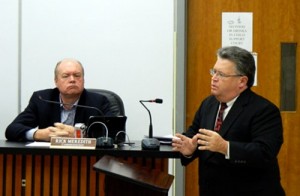
The salary dispute between the Anderson County mayor and sheriff focused on the spending to hire up to 36 new jailers to staff a 212-bed expansion that is still under construction at the Anderson County Detention Facility in Clinton.
CLINTON—The Anderson County mayor and sheriff reached an agreement Friday that could end their five-month-old legal dispute over an annual salary agreement, possibly closing one expensive and contentious chapter in local government even as it opened a new war of words between top officials.
Knox County Circuit Court Judge Dale C. Workman could sign the agreement Monday morning.
Anderson County Mayor Terry Frank and Sheriff Paul White said the agreement allows the sheriff to hire 15 full-time permanent deputies and additional temporary deputies when the sheriff deems appropriate as he prepares to open a 212-bed jail expansion. But the hiring must stay within the spending limit approved by the Anderson County Commission this year, and the temporary employees cannot work more than six months.
Frank and White announced the agreement in a one-page press release distributed Friday. The case had been scheduled to be heard in Knox County Circuit Court on Monday morning.
Firing the first shot, Frank quickly painted the agreement as a victory for her position. She said it contained the same offer she made to the sheriff even before he filed a lawsuit—officially known as a writ of mandamus—in July.
She said the sheriff had been misled into filing suit over the two-page salary agreement.
“Unfortunately, I believe Sheriff White fell prey to the political machinations of Commissioner Myron Iwanski and Law Director Jay Yeager to create dissension in what could have been an easily manageable agreement,” Frank said. “Commissioner Iwanski led people to believe we could budget for half-years for annual salaries, and Mr. Yeager continued the myth. Fortunately for the taxpayers of Anderson County, their efforts have failed.”

Anderson County Law Director Jay Yeager, right, talks to Anderson County Commission, including Commissioner Rick Meredith, during a special meeting in November.
Yeager soon fired back, saying Frank’s statements about him were false and have “no factual merit.”
“Obviously, the sheriff has prevailed in this disagreement, and the mayor is trying to put her political spin on this just outcome and unfortunately blame others for her lack of leadership ability,” Yeager said. “Despite past misstatements, the sheriff was never asking for additional monetary appropriations in his budget. He was always satisfied with the amount appropriated by County Commission in June and promised he could operate effectively and open the new jail expansion within that budget. The agreement reached today between the two parties is reflective of his satisfaction with the Commission’s budget.
“Unfortunately, due to the mayor’s desire to engage in protracted litigation, Anderson County citizens have to shoulder the financial burden of this unnecessary consequence.”
Iwanski also responded. He said the agreement allows the sheriff to hire the staff—up to 36 new jailers—needed to open the new jail. That’s what County Commission approved in the budget six months ago and what County Commission had asked the mayor to work out several times since July, Iwanski said.
“It’s unfortunate that in the mayor’s press release she continues to use character assassinations and misinformation as a way to justify this long and costly legal battle,” Iwanski said. “It’s baffling that something as simple as changing a few words in the salary agreement could not have been worked out much sooner and without going to court. This would have avoided all the legal costs and the hundreds of hours of staff time involved in this legal battle.”
The sheriff maintained his silence through the weekend, but he is expected to release a statement on Monday after Workman signs the order. (Update: The sheriff released a statement Monday afternoon.)
The dispute started this summer when Frank refused to sign the annual salary agreement proposed by the Anderson County Sheriff’s Department. She said it included about $7.7 million for salaries, roughly $1 million more than the $6.6 million that commission approved in June.
If she did sign the agreement, Frank said, the county commission would be committed to the new salary level under state maintenance-of-effort requirements, and that could lead to an eight-cent property tax rate increase in 2014.

Anderson County Sheriff’s Department Chief Deputy Mark Lucas talks about the sheriff’s proposed salary agreement, the subject of a legal dispute, during a special County Commission meeting in November.
But Anderson County Sheriff’s Department Chief Deputy Mark Lucas said the salary agreement required a calculation that assumed the department would be fully staffed with 218 employees at full salaries for a full year. And that wasn’t expected to happen for several reasons, Lucas said. Among them: 36 of the 218 workers would only be needed for a half-year to open the new jail pod after Jan. 1.
“We will never get to that,” Lucas said of the $7 million salary level.
He said the letters of agreement have been used for “many, many years” in a form suggested by the state comptroller, and the Sheriff’s Department has never spent the maximum amount included in the agreement because of employee turnover and probationary periods.
Commission was unable to resolve the dispute in July, and White filed suit.
By August, commissioners were already expressing concern over the legal fees, which by then were estimated to exceed $20,000.
“I don’t understand why this is going to court,” Iwanski said then. “I think it’s unfortunate that we’re hiring a lawyer to sue ourselves, basically. I think we need to stop the craziness.”
But efforts to “stop the bleeding” were unsuccessful.

At right, the main entrance to the Anderson County Detention Facility in Clinton is being remodeled as part of a roughly $10 million jail expansion project. A new 212-bed jail pod is under construction in the background at left.
A few days later, though, Frank and White announced they had reached an interim agreement that would allow the sheriff to hire another 15 deputies for an expanded jail and hire a coordinator for the Alternatives to Incarceration program. That narrowed the scope of the dispute to the additional 21 deputies that the sheriff was seeking to operate the new jail.
This past Friday, Frank said the salary agreement she and White signed Thursday matches the $6.6 million appropriation approved by the County Commission in June and does not contain the $7.7 million figure included in the earlier version of the salary agreement.
In addition, the sheriff agreed to 198 employees instead of 218 to reflect full funding for 15 additional jailers—and not 36, Frank said.
“(The) now-signed salary agreement answers my initial concerns over the extra million dollars and annual salaries,” Frank said. “I had made these offers before, but it is my belief that the law director was giving Sheriff White and County Commission conflicting legal advice that required the sheriff more time for legal research.”
But Yeager pinned the blame on Frank, saying the agreement reached last week could have easily been accomplished in July if she had participated in discussions with the sheriff.
Yeager said he did not draft or approve the salary agreement letter and never advocated any official or employee to file suit against the county. He said Frank’s decision to hire outside attorneys has cost Anderson County residents thousands of dollars.
Still unclear is whether outside attorneys representing Frank and White have the authority to sign an agreement that would reimburse the mayor’s legal fees from the Anderson County General Fund.
“I do have concerns about the agreed order signed by the two outside attorneys that appears to order the County Commission pay for her legal fees,” Yeager said. “The County Commission was not a party to this lawsuit, and I was denied the opportunity to be present at the mediation by the mayor’s attorney. Only County Commission can authorize budgetary expenditures from the county’s general fund and not two outside attorneys.”
See the settlement documents here:Â Sheriff’s Salary Suit Settlement Documents.
See the mayor’s press release:Â Anderson County Mayor’s Press Release.
See the law director’s press release:Â Anderson County Law Director’s Press Release.
See an earlier guest column by Iwanski.
More information will be added as it becomes available.
Note: This story was last updated at 9:30 a.m.







Leave a Reply